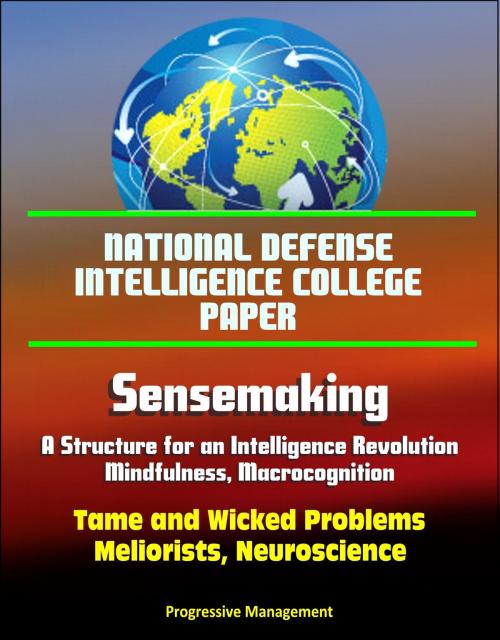National Defense Intelligence College Paper: Sensemaking - A Structure for an Intelligence Revolution, Mindfulness, Macrocognition, Tame and Wicked Problems, Meliorists, Neuroscience
Nonfiction, History, Military, United States, Social & Cultural Studies, Political Science, Government| Author: | Progressive Management | ISBN: | 9781310434501 |
| Publisher: | Progressive Management | Publication: | December 13, 2013 |
| Imprint: | Smashwords Edition | Language: | English |
| Author: | Progressive Management |
| ISBN: | 9781310434501 |
| Publisher: | Progressive Management |
| Publication: | December 13, 2013 |
| Imprint: | Smashwords Edition |
| Language: | English |
This unique and informative paper was produced by the National Intelligence University / National Defense Intelligence College. Sensemaking, whereby intelligence professionals would work with executive decisionmakers to explain data that are "sparse, noisy, and uncertain," requires an interpreter and experienced champion to bring about a practicable understanding and acceptance of the concept among intelligence practitioners. Topics and subjects covered include: Wicked problems, intuition, pandemics, tame problems, macrocognitive, analytic pathologies, macrocognition, microcognition, metacognition, flexecutive planning, state and non-state actors, mindfulness, synthesis, meliorists, multimethodological, neuroscience.
Sensemaking is a tall order, but there is no better sherpa for the unfamiliar terrain of this new paradigm than David Moore. He almost uniquely embodies both practice and academic scholarship. Indeed, one of the tantalizing aspects of his academic work is that, as a careful intelligence professional (and one from NSA to boot), he is very careful about classification. That means the visible trails of his practice in his scholarship are sparse, and his cases are mostly familiar ones, albeit ones often spun in new directions. His approach to sensemaking takes us from information foraging, harvesting and marshalling into understanding. He looks at various forms of tacit knowledge, and he and the contributors report on some intriguing tests of sensemaking. Several of us who looked around the Intelligence Community in the years after September 11th noted how little use it made of formal methods or machines other than computers for sorting. Worse, in some sense the Cold War practice of analysis sought to turn humans into machines by rooting out judgment, bias, hunch, stereotyping—all the things humans do best.
Preface: On Being Mindful * What is Mindlessness? * Attaining Mindfulness * Acknowledgments * Definitions * Chapter 1: Introduction * Where We Are * A Roadmap * Kent's Imperative * Chapter 2: The Failure of "Normal Intelligence" * Intelligence Challenges * Errors and Failures * Considering Standard Models * Types of Problems * A Wicked Look at Wicked Problems in Intelligence * An Intelligence Example: Pandemics as Wicked Problems * Complexity * Chapter 3: From Normal to Revolutionary Intelligence * Evidence-Based Intelligence Creation * Considering the Normal * Paradigm Shift * Chapter 4: The Shape of Intelligence Sensemaking * Planning for Tame and Wicked Intelligence Problems * Foraging * Marshaling * Understanding * Communicating * Chapter 5: A Practice of Understanding * Intuition * Types of Judgment * Thinking About Anticipating * The Roles of Intuitive Thinking in Intelligence Sensemaking * Does More Information Improve Anticipation? * Future Vision: Red Brains, Blue Brains? * Looking Ahead * Chapter 6: Considering Validation * Analogies from Other Fields * Replication in Intelligence * Validation in Foresight and Hindsight * Validating the Practice of Intelligence Sensemaking * Seeking Validation: Toward Multiple Methods * Chapter 7: Making Sense of Non-State Actors: A Multimethod Case Study of a Wicked Problem * Introduction * Introducing the Wicked Problem of Non-State Actors * Three Approaches to Making Sense of Non-State Actors * Approaches and Methodologies * Critical Assessment: Lessons Learned from the Study of Non-State Actors * Changes in the Roles of Non-State Actors: An Alternative View * Moving Beyond a Proto-Revolution * Chapter 8: Establishing Metrics of Rigor * Defining Intelligence Rigor * Assessing Sensemaking Rigor in Studies of Non-State Actors * Observations and Discussion * Chapter 9: Implications, Limitations, and Conclusions * Considering Foresight * Implications * Limitations
This unique and informative paper was produced by the National Intelligence University / National Defense Intelligence College. Sensemaking, whereby intelligence professionals would work with executive decisionmakers to explain data that are "sparse, noisy, and uncertain," requires an interpreter and experienced champion to bring about a practicable understanding and acceptance of the concept among intelligence practitioners. Topics and subjects covered include: Wicked problems, intuition, pandemics, tame problems, macrocognitive, analytic pathologies, macrocognition, microcognition, metacognition, flexecutive planning, state and non-state actors, mindfulness, synthesis, meliorists, multimethodological, neuroscience.
Sensemaking is a tall order, but there is no better sherpa for the unfamiliar terrain of this new paradigm than David Moore. He almost uniquely embodies both practice and academic scholarship. Indeed, one of the tantalizing aspects of his academic work is that, as a careful intelligence professional (and one from NSA to boot), he is very careful about classification. That means the visible trails of his practice in his scholarship are sparse, and his cases are mostly familiar ones, albeit ones often spun in new directions. His approach to sensemaking takes us from information foraging, harvesting and marshalling into understanding. He looks at various forms of tacit knowledge, and he and the contributors report on some intriguing tests of sensemaking. Several of us who looked around the Intelligence Community in the years after September 11th noted how little use it made of formal methods or machines other than computers for sorting. Worse, in some sense the Cold War practice of analysis sought to turn humans into machines by rooting out judgment, bias, hunch, stereotyping—all the things humans do best.
Preface: On Being Mindful * What is Mindlessness? * Attaining Mindfulness * Acknowledgments * Definitions * Chapter 1: Introduction * Where We Are * A Roadmap * Kent's Imperative * Chapter 2: The Failure of "Normal Intelligence" * Intelligence Challenges * Errors and Failures * Considering Standard Models * Types of Problems * A Wicked Look at Wicked Problems in Intelligence * An Intelligence Example: Pandemics as Wicked Problems * Complexity * Chapter 3: From Normal to Revolutionary Intelligence * Evidence-Based Intelligence Creation * Considering the Normal * Paradigm Shift * Chapter 4: The Shape of Intelligence Sensemaking * Planning for Tame and Wicked Intelligence Problems * Foraging * Marshaling * Understanding * Communicating * Chapter 5: A Practice of Understanding * Intuition * Types of Judgment * Thinking About Anticipating * The Roles of Intuitive Thinking in Intelligence Sensemaking * Does More Information Improve Anticipation? * Future Vision: Red Brains, Blue Brains? * Looking Ahead * Chapter 6: Considering Validation * Analogies from Other Fields * Replication in Intelligence * Validation in Foresight and Hindsight * Validating the Practice of Intelligence Sensemaking * Seeking Validation: Toward Multiple Methods * Chapter 7: Making Sense of Non-State Actors: A Multimethod Case Study of a Wicked Problem * Introduction * Introducing the Wicked Problem of Non-State Actors * Three Approaches to Making Sense of Non-State Actors * Approaches and Methodologies * Critical Assessment: Lessons Learned from the Study of Non-State Actors * Changes in the Roles of Non-State Actors: An Alternative View * Moving Beyond a Proto-Revolution * Chapter 8: Establishing Metrics of Rigor * Defining Intelligence Rigor * Assessing Sensemaking Rigor in Studies of Non-State Actors * Observations and Discussion * Chapter 9: Implications, Limitations, and Conclusions * Considering Foresight * Implications * Limitations















